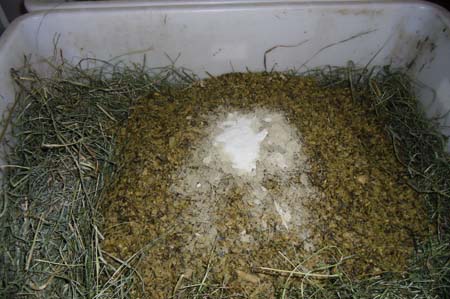Migulators and microorganisms are promoted as part of a sustainable circular economy beyond their use as feed additives. In addition to improving the animals' digestive performance, the use of these preparations is said to have a positive effect on stable hygiene (germ reduction) and also the stable climate (active binding of odorants). The use of liquid manure to regulate the quality of manure (nitrogen binding, odor binding) can also increase the efficiency of manure. A scientifically based statement on the effect of the feed additives that are now being aggressively advertised is still missing and requires objective testing.
Goals of the project:
- Testing the effect of clinoptilolite on feed intake, milk production and quality as well as on the blood concentrations of the quantitative elements in lactating dairy cows:
The majority of studies carried out to date on the use of zeolite in feeding dairy cows have been carried out with synthetically produced zeolite A. These feeding trials were carried out on dry cows, mainly to test the effect on Ca metabolism and the associated use of the feed additive to prevent milk fever and subclinical hypocalcemia. However, in the few studies with lactating dairy cows, negative effects of zeolite administration on production data were found. There are hardly any studies in the literature on the use of natural zeolite (clinoptilolite) in cattle or lactating dairy cows. In contrast to synthetic zeolite, in most studies with material of natural origin (clinoptilolite), no negative effect on mineral metabolism or production parameters was observed.
- Testing the use of the lactic acid bacteria strains L. rhamnosus and L. paracasei (in combination with a herbal extract) in dairy cattle feeding:
The mechanisms of action and effects on production parameters of “direct-fed microbials DFM” (different bacterial strains, yeasts, fungi and mixtures thereof) in ruminant rations have been described in several reviews. Lactating dairy cows were fed a synbiotic consisting of Lactobacillus casei subsp. casei and dextran both significantly higher milk yields and higher milk ingredients were found. Feed additives based on Lactobacillus sp. In other experiments, they also had a significant influence on the amount of milk fat produced daily. Since the mechanisms of action partly depend on the bacterial strains used, preparations (particularly mixtures) must be tested separately for their effects. Experimental work on the bacterial strains used in this project is largely missing.
- Investigation of manure quality after feeding clinoptilolite and lactic acid bacteria:
Based on the measurement of physical parameters from monitoring in experimental slurry tanks and chemical analysis, an assessment of the soil compatibility and the climate relevance of the slurry will be carried out. For example, pH has a major influence on nitrogen emissions.
Further information on project management can be found in the database for research and sustainable development (Dafne) -> Link







